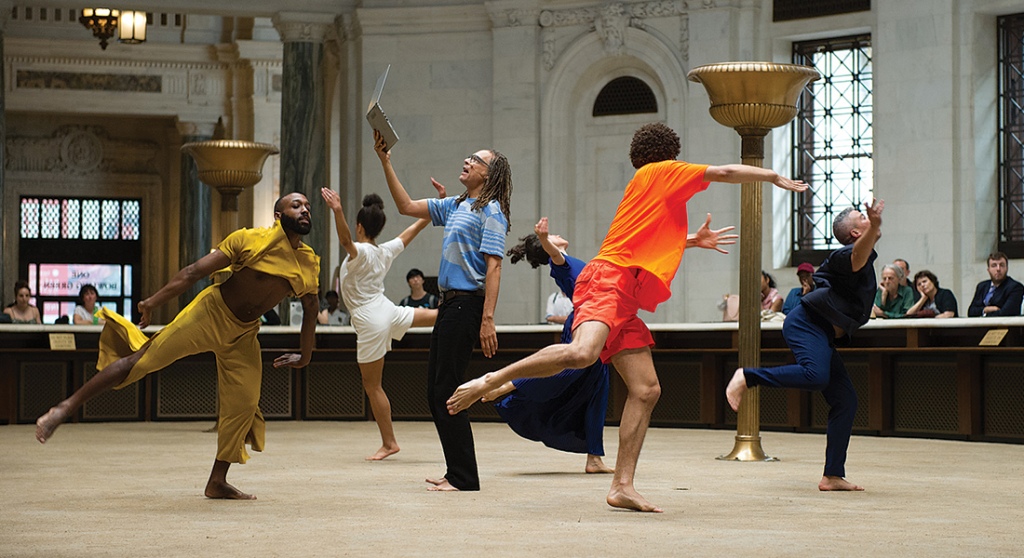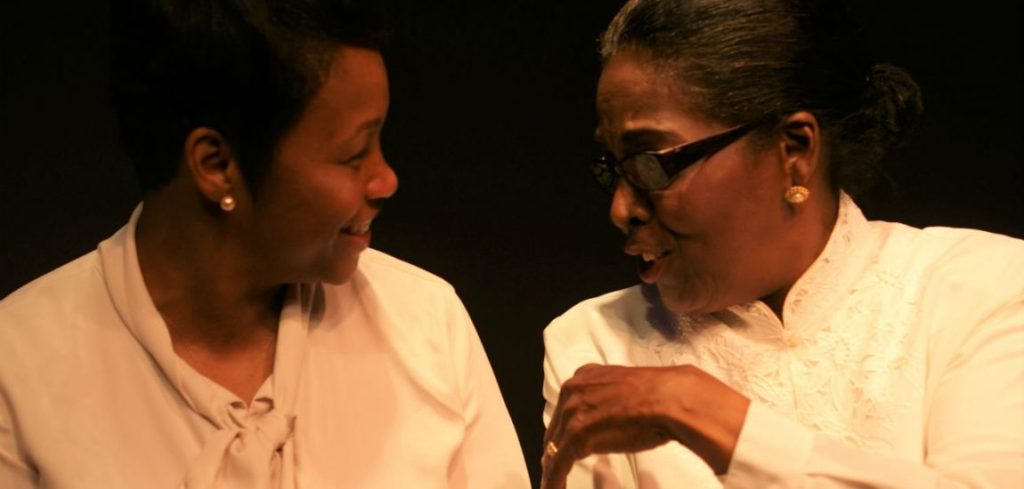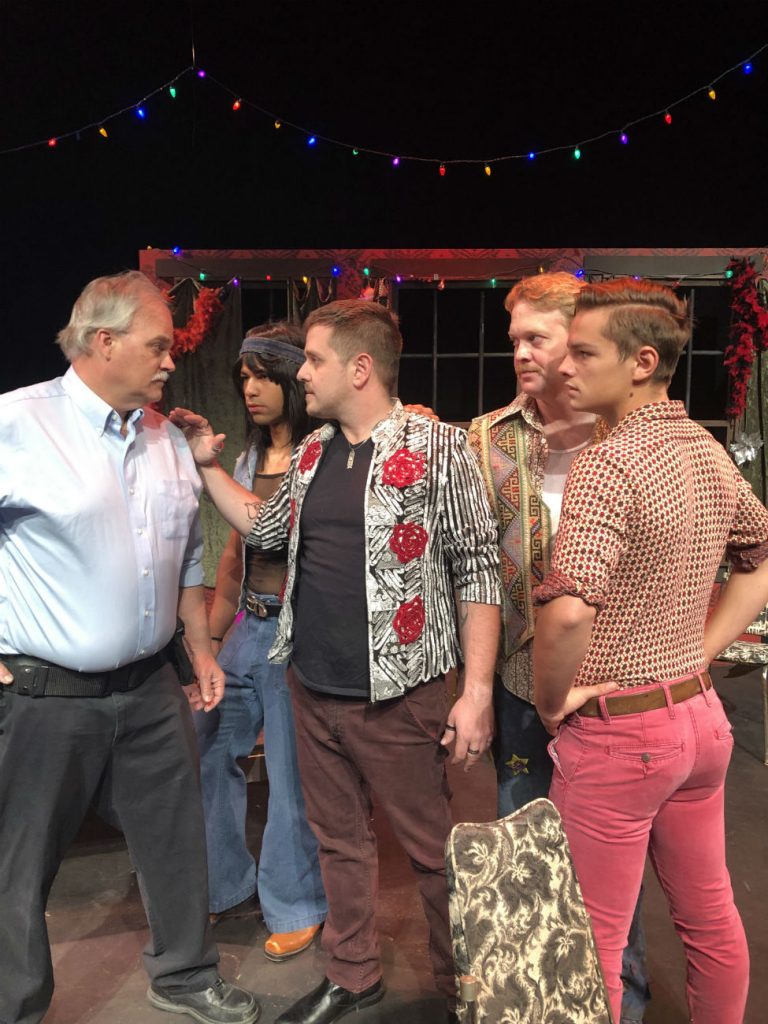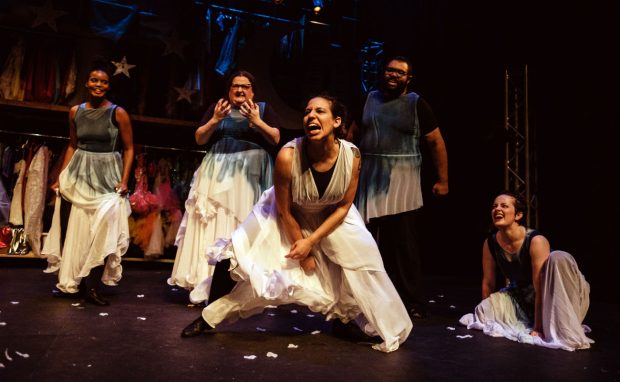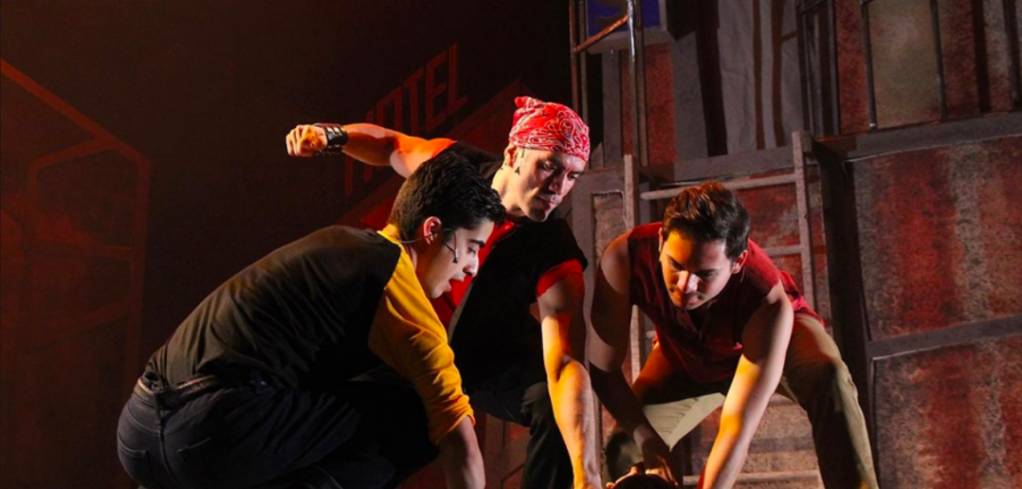
What a great year for theater – seeing 53 shows over four cities, with particularly good batting averages on the three New York trips. Also, every company in Columbus was hitting this year. Some of the best work I’ve seen in years from MadLab, Opera Columbus, and Evolution, lined up with front-to-back strong seasons from The Contemporary (formerly CATCO) and Available Light, a renewed interest in dance and theater from the Wexner Center, Short North Stage stretching its wings, all added up to more I wanted to see than I could make happen. Even when I didn’t love some of the work, almost every single thing I saw, I admired the effort and the swing they took. It’s a good time to be a fan of theater in town, get out and see as much as possible,
Everything listed here is in chronological order and in Columbus unless otherwise noted. The companies provided all photos for promotion, either sent to me directly or taken from websites.
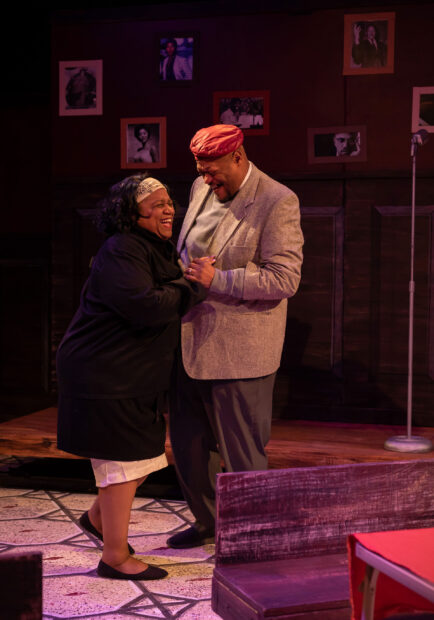
- KL II by Kaneza Schaal, directed by Kaneza Schaal and Christopher Myers (Under the Radar Festival, NYC) – I only made it to one thing out of the three I had booked at Under the Radar this year – one canceled early, one canceled while I was at the Public – but this reaffirmed what a great thing the festival is for those of us who love experimental theater. Kaneza Schaal braided the text of Mark Twain’s King Leopold’s Soliloquy with a personal history with Patrice Lumumba’s independence speech with personal history with so much else and fused it to a blue flame of a performance and fascinating design and direction choices.
- Snowville Cafe by Julie Whitney-Scott, directed by James Blackmon (MadLab) – Julie Whitney-Scott, one of my favorite theater artists in town, had an astonishing year directing a regional premiere of Pulitzer Prize-winning writer Lynn Nottage, classics like Lorraine Hansberry’s Raisin in the Sun, leading her spectacular tradition of Columbus Black Theater Festival, writing her first novel, it was a dazzling record of work. But my favorite piece, the thing that I kept talking about months after it closed, was this luminous slice of life James Blackmon directed for MadLab. I called it “a poetic character study that also makes its setting a vibrant, fascinating character, with a real love for its characters but a sometimes unsparing eye for their faults. The empathy of the writing and direction are so perfectly in sync they almost seem invisible,” in my review for Columbus Underground.
- Everybody by Branden Jacobs-Jenkins, directed by David Glover (Available Light) – Available Light continued their astonishing streak this year. Everything they did had the unshakable feeling of “I can’t picture anyone else doing this.” David Glover’s stunning production and brilliant cast were up to the challenge of fusing the technical difficulty – the main five actors pull their characters out of a hat – to the piece’s deep themes and rich humor. I said it, “[highlights the shifting volatility, the danger of using our friends as a mirror of ourselves, but the absolute necessity of friends,” in my review for Columbus Underground.
- Afro/Solo/Man by Orlando Zane Hunter, Jr. and Ricarrdo Valentine (Brother(hood) Dance, presented by Wexner Center for the Arts) – The Wexner Center also pulled itself up this year, drawing on some local talent and some far-flung relationships, to put out work I can’t picture any other presenting organization bringing to town. This gut-wrenching dance piece by Hunter and Valentine, about generational trauma and internalized shame but also abundant, bursting-at-the-seams joy, had me babbling about it for weeks after seeing it.

- Maria de Buenos Aires by Astor Piazzolla and Horacio Ferrer, directed by Christopher Darling (Opera Columbus) – Opera Columbus continues killing it and this Piazzolla operetta lined up with my tastes with sniper-like precision. I said, “The parallel singing and dancing choruses also set the world of the play, accentuating the collage aspects and the surging drama and eroticism. This riff on an opera-ballet with tango feels simultaneously organic and surprising,” in my piece for Columbus Underground.
- Seven Guitars by August Wilson, directed by Ron OJ Parson (Playhouse in the Park, Cincinnati) – Finally got to see the last of the August Wilson Pittsburgh cycle with this sumptuous production at one of Ohio’s shining theaters, Cincy’s Playhouse in the Park. Bryant Bentley’s Red Carter and Dimonte Henning’s Schoolboy Barton are performances burned into my brain.

- When We Were Young and Unafraid by Sarah Treem, directed by Michelle Batt (eMBer Women’s Theatre) – eMBer Women’s Theatre has come into its own over the last few years, and this year they blew me the hell away with a gorgeous, knife-twisting look at shifting social mores, pervasive sexual violence, the need to connect – and the way that can be a source of strength or twisted into something terrible, with astonishing performances, especially by Sue Wismar and Matthew Sierra. I said, “[The] characters’ arguments about the times changing and the chilling prescient words “They’ll change back,” resonate long after the lights go back on the play,” in my review for Columbus Underground.
- The Wolves by Sarah DeLappe, directed by Aviva Helena Neff (The Contemporary Theatre of Ohio) – The second production of Sarah DeLappe’s magnificent coming-of-age play The Wolves I’ve seen in a few years, and I’m still knocked out by the play and the synchronicity in coming together and splitting apart personified by the cast hear left my jaw in my lap with awe and broke me in the right measures. For Columbus Underground, I said, “[It] reminded me of its ability to surprise through the quality and sharpness of its execution. It’s hard for me to picture seeing a better production of this beautiful, life-affirming, heartbreaking play.
- Machinal by Sophie Treadwell, directed by Ryan Naughton (The Sound Company) – Ryan Naughton and Jessica Hughes gave the Columbus theatrical scene a powerful shot in the arm in their few years here, teaching at OSU, and their crowning achievement was a powerful production of landmark expressionist play Machinal by their Sound Company. I said, This production is rich with jagged beauty and a perfect example of how irony can be used to make something hurt more, not less. How much more potent can abstraction be at evoking a feeling than spelling something,” for Columbus Underground.

- Beautiful by Doug McGrath and the music of Carole King et al, directed by Dionysia Williams (Short North Stage) – I didn’t see a bad production by Short North Stage all year, but this jukebox musical – which might have had the hardest go with me walking in, given the depth of my familiarity and love of the Carole King-Gerry Goffin songs and the milieu around them, and this captured it so perfectly, anchored by brilliant performances by Britta Rae, Corbin Payne, and Nick Lingnofski. For Columbus Underground, I said, “The book has enough pain and richness to give ballast to the material, but Beautiful never lets anything get in the way of the power and beauty of these songs.”
- The Comeuppance by Branden Jacobs-Jenkins, directed by Eric Ting (Signature Theatre Company, NYC) – Branden Jacobs-Jenkins is one of the playwrights I’ll see anything that comes out if I can at all make work. I was overjoyed that one of the last matinees overlapped with our middle trip to New York this year. I got there – after two hours a few blocks north of the Signature complex having some drinks and laughs at staple Rudy’s Bar and Grill- and was dismayed to find out the performance was over two hours with no intermission. I’m used to that meaning, “We don’t trust the material/we want to exert some dominance over the audience/people will leave.” But for 2:15, I was staggered, enraptured, blown away. Every tool Jacobs-Jenkins has carefully sharpened is deployed in heartbreaking, unsettling ways with a phenomenal cast in this mythopoetic riff on The Big Chill that tells a story about reckoning with youth, trauma, and who has the right to a story; to pain; that I haven’t heard before. I’m dying to see this again and have already pre-ordered the script in book form (coming out next summer). I saw a couple of things this year where I both immediately said, “This is the best thing I’ve seen,” and I still think that later in the year (you’ll see the other further down this list); this was one of them.
- Sweeney Todd by Stephen Sondheim and Hugh Wheeler, directed by Thomas Kail (Lunt-Fontanne Theatre, NYC) – I’ve seen a good number of the recent Sweeney Todd revivals, the first Sondheim I loved thanks to an introduction to the taped George Hearn/Angela Lansbury performance from childhood friend Matt Porreca, and I love the attempts at realism, psychological or otherwise. But it was an unalloyed joy to see this Thomas Kail-directed version that focused on the sumptuous music, playing the original orchestrations and with a dynamite lead from Josh Groban, in almost a sharp-edged comic book interpretation. And as with the Sunday Anne and I saw a few years ago, Annaleigh Ashford’s Mrs. Lovett runs away with the whole goddam show, just a dynamite performance.

- The Inheritance by Matthew Lopez, directed by Joe Bishara (Evolution Theatre Company) – Evolution has been swinging for the fences the last couple of years, and, in my eyes, it’s really paid off. The ambition of this huge cast recasting of Howard’s End to deal with the aftermath of the AIDS crisis, which was the play everyone was talking about when Anne and I were in London (and I couldn’t fit it into the schedule), follows great work Evolution has done with Lopez’s writing like the intimate character-driven Poz and gets to luxuriate in this over two three-hour parts. I called it, “About how we tell stories, how stories bring us together, give us a framework for living, and in the same breath – and sometimes the same story – let us delude ourselves and others, build walls, and slowly (or slowly-then-suddenly) rot us from the inside,” as I reviewed Part 1 and Part 2 for Columbus Underground.
- POTUS by Selena Fillinger, directed by Leda Hoffmann (The Contemporary Theatre of Ohio) – Fresh off Broadway, POTUS affirmed Hoffmann’s commitment to brand new work and stewardship as CATCO transitioned into The Contemporary Theatre of Ohio. It’s a crackling burlesquing of the highest hallways of power and riotous, hilarious entertainment. It may have been the hardest I laughed all year. I said the production was “A springloaded machine of everything getting worse in ways we see coming, but at just enough of an angle, the wind is knocked from our lungs as a precursor to the following laughs. Hoffmann and her cast excel at this, ratcheting in the tension up, weaving in call-backs (if there’s another inflection you can put on “ass play” we don’t see in this play, I can’t think of it) so they embed in our brains and still getting that jolt of surprise when they detonate, with just enough release to make the pace feel frenzied without being exhausting,” in Columbus Underground.
- What the Constitution Means to Me by Heidi Schreck, directed by Dakota Thorn (Available Light) – Dakota Thorn, who I’ve long admired as an actor, hit it out of the park with her first – I think – directing and Available Light member Michelle Schroeder-Lowrey is the perfect fit for this funny, intensely moving snapshot of a slice of America from Heidi Schreck. I said, “Hilarity – starting with the 15-year-old Heidi talking about the constitution in bodice-ripper terms (“a sweaty, steamy document”), deep dives into specifics of language, and abject horror bump right up against one another, without feeling unbalanced. In the late-play discussion of Town of Castle Rock v. Gonzales, the play draws a clear line between an abstraction being the point, the nitpicking of “shall” as a dodge, a way to avoid letting people into the argument being seen by the court, and the breathless, sometimes delirious love of words as a way to let people in, to truly see them, instead of shutting them out, as the play does,” in my review for Columbus Underground.
- Infinite Life by Annie Baker, directed by James Macdonald (Atlantic Theatre, NYC) – I can’t think of a contemporary writer who burrows into the most banal – and simultaneously most intimate – spaces of modern life with more agility and a sharper knife than Annie Baker. This look at seven women in a spa/health retreat that’s not explicitly described is a master class in interweaving perspectives; the way we talk with the knob turned all the way up until it seems strange. Anne and I talked about this all the way down 8th Avenue to the Vanguard (see this year’s live music list), and I’m still turning it over in my head, trying to make sense of it in the best way.

- Merrily We Roll Along by Stephen Sondheim and George Furth, directed by Maria Friedman (Hudson Theatre, NYC) – Everything you’ve heard about this is true. Easily the strongest, most fully realized version of this underdog of the Sondheim canon, directed with a sure hand and razor-sharp timing by Maria Friedman, who uses her storied history with Sondheim and her internalizing of those rhythms to make everything breathe and, crucially, peels back a little more of the onion on Franklin Shepherd (a stunning Jonathan Groff) to show the people pleaser quality at the heart of all that grasping – the first time I really believed that line, “I’ve only made one mistake in my life but I’ve made it over and over again: saying ‘Yes’ when I meant ‘No.’” Daniel Radcliffe kills me as the righteous purist Charley Kringus, and Lindsay Mendez, new to me, gives a more fleshed-out version of Mary Flynn, taking her out of the Dorothy Parker caricature while still nailing those lines than I’d previously seen.
- Which Way to the Stage? by Ana Nogueira, directed by Edward Carignan (Short North Stage) – I didn’t realize how much I’d missed Short North Stage’s taste in non-musical plays until this breath of fresh air reminded me. It felt really good being back in the Green Room, laughing and thinking. In Columbus Underground, I said, “[It] treats these heavier themes with the gravity they need – how does this thing you love change, and what happens when it doesn’t? How do we look to other people? – but they never get in the way of the laughs. It’s a delightful comedy with a sniper-targeted sense of its audience.”
- Ghost Quartet by Dave Malloy, directed by Drew Eberly (Available Light) – The other thing that stood out to me as the best thing I saw all year, a song cycle with theater running through its veins, that denied my easy understanding as much as it made me love it. For Columbus Underground, I said, “Malloy and the cast, under Eberly’s sure hand, dig into a purer emotional landscape, the way a song feels as it moves through you, and the late nights of wanting to one-up one another because you love the people you’re with so much; while still having all the insecurities and viciousness that makes us human.”
- Good Grief by Ngozi Anyanwu, directed by Shanelle Marie and Alan Tyson (Contemporary Theatre of Ohio) – Shanelle Marie and Alan Tyson collaborated on directing this lovely meditation on loss, friendship, and growing up by Ngozi Anyanwu, a jewel in a very strong season from The Contemporary Theatre of Ohio. For Columbus Underground, I said, “The ability, starting in Anyanwu’s text and emphasized by Marie and Tyson’s direction, not to demonize anyone, to find drama without making anyone a villain, showing us people who are all doing their best is a rare gift and a pleasure I don’t get often enough in any medium.”


